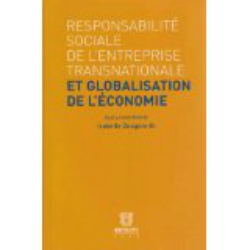Sept. 6, 2017
Breaking news

Regulation of the digital world, we agree on its necessity, we talk about it a lot but it is difficult to do it.
The stakes are multiple: management of innovation, protection of people, treatment of different sorts of powers, future of the human being, the Politics and the Judge being like a bullet that ricochets between these 4 subjects.
It then rediscovers that the first "regulators" are the Governments and that the first modality of the Regulation Law is the taxation.
Notably in the digital field and even more so in the face of GAFA.
Indeed, the 4 American companies, Google, Apple, Facebook and Amazon, admit the need for rules but propose self-regulation or co-regulation. These would include not only their own behavior, but also those of others, including the fight against terrorism. Maybe, when one is stronger than the States, he should substitute himself for their core business....
Undoubtedly being dispossessed of the regalian, Europe today demands "accounts" to the GAFA in the literal sense of the term. Indeed, the French and German governments will table in September a tax proposal specific to the GAFA, the fruit of which will come back to the countries where they earn their income.
Concerned companies replied that in the tax system everyone has the right to be skilled and to organize at the best, so long as one does not fall into the abuse. In accordance with this legal conception, the French administrative high Court (Conseil d’État) has just recalled it in an important decision to their benefit.
In August 2017, the French Minister of Economy and Finance, Bruno Lemaire, justified the reiteration of his will to tax them, raising this issue at European level in the name of "distributive justice", the Law being defined as what gives everyone his share. This is a strong but dangerous argument, for while it is true that in the very function of taxation, correlated with public finances, the redistributive function is essential, tax optimization becomes staggering.
In a more convincing and regulatory way, this measure of equity is presented as correlated to the construction of the European digital market. It is an economic conception. To the extent that European taxation is still embryonic, its link with such a construction would make it possible to see in vivo the strength of the tax tool in Regulation Law, more than ever distant from Competition Law.
It is in this context, and because the European Digital Market must be built at forceps, since the GAFA will benefit from it, but also must participate in its construction, that such an investment sharing is justified.
Oct. 5, 2016
Events : JoRC


June 20, 2016
Breaking news

Little is known about how to ‘regulate the Internet’…
Outline solutions, however, do seem to have to be found in ex-post mechanisms since Regulation (broadly speaking) understand ex-ante and ex-post mechanisms as a continuum, and since Regulators increasingly concentrate ex-post mechanisms in their hands as an effective way to ensure execution of the ex-ante prescriptions they themselves elaborated.
Ex-ante mechanisms aim at making algorithms more ‘loyal’.
As long as we hope for devices to be trustworthy and to be held accountable for their ‘loyalty’, we give merits to the idea that we probably should “take liability seriously”.
On June 14, 2016, the Californian father of one of the victims of the 11/13/2015 Paris attacks filed a suit in a U.S. District Court to prosecute Google, Facebook and Twitter.
The legal dispute is clear.
The applicant based its claim to hold the companies liable on the grounds that they let terrorist groups use their networks: “The suit claims the companies “knowingly permitted” the Islamic State group, referred to in the complaint as “ISIS”, to recruit members, raise money and spread “extremist propaganda” via their social-media services”.
Conversely, the defendants unanimously claimed that they had actively implemented ‘policies’ against extremist material, and that they were working with law enforcement entities to improve regulations on the matter. Self-regulation and ethics versus common liability law.
The companies also pointed out the fact that they were not publishers, hence they could not face liability for the material users post on their networks. This is not, however, the issue at stake: the complaint concerns the use of the network not as a mere way to broadcast messages, but as a way to recruit murderers, provide them with convenient tools to communicate and to prepare criminal operations—allegations for which law does not exempt social media companies from liability.
These allegations are worth being ‘taken seriously’, should the law be unclear on whether the companies could be charged indeed, and should the total exemption from liability of such companies pleading for their ‘neutrality’ be the exception rather than the norm.
The question of principle is thus as follows: is exemption from liability of those who hold the ‘digital space’ together really the norm?
If so, their exemption from liability needs to be extended to a scenario that had not been covered by the law yet. If not, then common liability law is the rightful legal basis to assess whether the companies can be found liable or not—provided that a direct causal link between the unlawful act and an actual harm suffered by the applicant can be demonstrated.
The legal dispute is clear.

Jan. 9, 2015
Breaking news

The United Kingdom is probably country of "self-regulation", many academics devote studies, regulators praise its merits, the legislation puts it in place. This is in the area of the press. The electronic media are regulated by OFCOM, but the written press is still self-regulated. British tradition remains so.
La presse britannique, dont on connait la variété du niveau, du Daily Mirror à The Economist et à propos de laquelle les scandales sont nombreux à propos des violations de vie privée et des méthodes pour acquérir les informations, est "autorégulée".
C'est pourquoi un rapport a été publié en 2012, le rapport Leveson, lui-même continuant à recommander l'autorégulation. Sur cette recommandation, a été élaborée le Press Recognition Panel (PRP), entré dans le système juridique par une "Charte royale" le 30 octobre 2013, articulé avec un organe de supervision, le Independent Monitor for the Press (IMPRESS), créé quelques mois plus tard. On ne sait si cela avait bien fonctionné, mais le 8 septembre 2014 le premier organisme est absorbé par le second.
Oct. 22, 2014
Thesaurus : 02. European Union
Feb. 4, 2014
Thesaurus : Doctrine

Updated: Jan. 9, 2012 (Initial publication: Jan. 9, 2012)
Thesaurus : Doctrine
Updated: Dec. 20, 2011 (Initial publication: Dec. 20, 2011)
Thesaurus : Doctrine
May 4, 2010
Thesaurus : Doctrine

Complete reference: Daugareilh, I (ed.), Responsabilité sociale de l'entreprise transnationale et globalisation de l'économie, Bruylant, Bruxelles, 2010, 818 p.
Read the coverback (in French)
